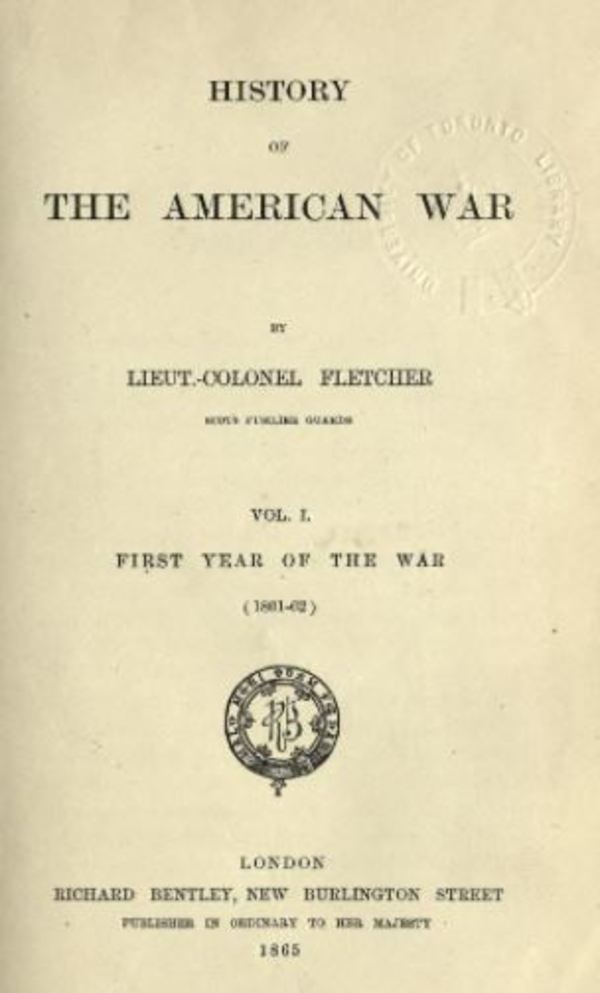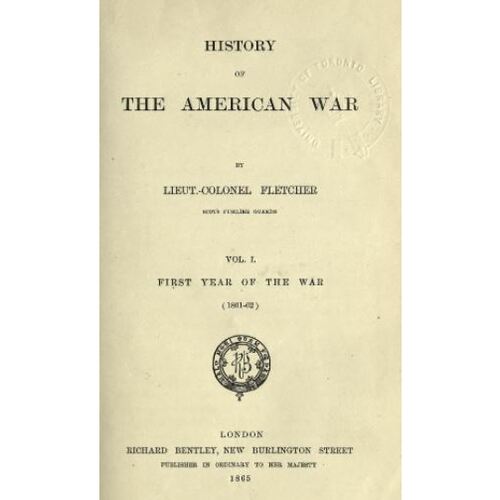
Source: Link
FLETCHER, HENRY CHARLES, soldier, private secretary, and author; b. 28 April 1833 at Sussex Place, Regent’s Park, London, Eng., son of Major-General Edward Charles Fletcher, magistrate of Kent, deputy-lieutenant for Kirkcudbright County, Scotland, and the Hon. Ellen Mary Shore, daughter of John, 1st Lord Teignmouth; d. 31 Aug. 1879 at Putney, Eng.
Henry Charles Fletcher’s mother died when he was two years old and three years later his father married Lady Frances, daughter of Charles, 2nd Earl of Romney. In November 1850 Henry Charles obtained a commission as ensign in the Scots Fusilier Guards (and as lieutenant in the army). He saw active service in the Crimea in 1856, and promotion to captain (and lieutenant-colonel in the army) came in June 1859. He travelled to Canada with the 2nd Battalion in the Guards brigade at the end of 1861, when troops were sent out during strained relations between Great Britain and the United States following the Trent incident. He took the opportunity to see the American Civil War and was present at the battles of Williamsburg, Fair Oaks, and the Seven Days. General George Brinton McClellan showed him “every courtesy,” had him pitch his tent near his own, and invited him to stay as long as he wished. Fletcher thus learned the power of the new American armies. His reports to General Sir William Fenwick Williams*, the commander-in-chief in North America, were brought to the notice of the Duke of Cambridge at the Horse Guards. Returning home before his regiment, Fletcher married Lady Harriet, second daughter of Charles, 3rd Earl of Romney, on 24 Sept. 1863. He also published a three-volume History of the American war.
Fletcher appeared before the commission on military education of 1868–69, presided over by Lord Dufferin [Blackwood*], and there advocated that British infantry and engineer officers should be trained together as in the United States. This proposal was not accepted by the commission but Dufferin invited Fletcher to join it as a member for the second part of its investigation, the education of other ranks.
In 1872 Dufferin was appointed governor general of Canada. Because there were no troops in central Canada, he was not given a military secretary and therefore took an officer, Fletcher, as his private secretary to Ottawa. Fletcher’s wife was considered a suitable companion for the Countess of Dufferin [Hariot Georgina Hamilton] in the bourgeois society of North America, and the Fletchers enjoyed the gay social life of Rideau Hall. The secretary’s chief task was to develop a military spirit in Canada so that the Canadian government might be induced to make adequate provision for defence. He lectured to militia officers and others on the theme that the peaceful attitude of the United States, which then only had forces scattered along the Indian frontier, might change overnight and that every nation must have military forces at its disposal if it wished to survive. Dufferin forwarded Fletcher’s memorandum on this subject to his ministers and to the War Office, and Fletcher published his lecture at his own expense. He suggested Canada should train its militia officers in permanent schools.
In 1869 Dufferin had obtained a report on the United States Military Academy for his commission on military education. Colonel Sir Patrick Leonard MacDougall*, its author, had stressed West Point’s high moral qualities, which contrasted strongly with what the commission heard about the Royal Military College at Sandhurst. In April 1874, sent by Dufferin, Fletcher visited West Point and supplemented MacDougall’s report to the effect that the great contribution West Point had made could be duplicated in Canada by a similar institution in which officers of all arms would be trained together. Fletcher’s report was important in influencing Alexander Mackenzie* to establish the Royal Military College of Canada at Kingston in 1875.
The Canadian government offered Fletcher £80 as an honorarium for the report, but he courteously refused it. He had been promoted colonel in the army in 1874 and was considered for appointment as GOC Canadian Militia, but he preferred to return to his regiment in 1875 as major lest his professional career be jeopardized by long absence. Dufferin reported to the colonial secretary and the commander-in-chief that Fletcher had contributed substantially to the revival of the military spirit in the dominion; he was decorated with the cmg.
After his return to England, Fletcher was aide-de-camp to the Duke of Cambridge and a justice of the peace in Kent. He lectured to the Royal United Service Institution on the use of colonial forces in imperial wars. But he retired on half-pay in March 1879 and died at his residence, Spencer House, at the comparatively early age of 46, a few days after he had sold his commission. He left a son, and “other issue.”
In Dufferin’s opinion Fletcher was “not particularly brilliant or quick,” but he was “sensible and trustworthy. . . . Everybody . . . liked him.” Fletcher’s History of the American war, although sound, shows little insight into the revolutionary changes taking place in warfare. Nevertheless Fletcher did much to foster the development of suitable military institutions in Canada and a comment in an obituary, that by his death the army lost an able and zealous soldier, is fully justified.
H. C. Fletcher, The defence of Canada; a lecture delivered at the Literary and Scientific Institute (Ottawa, 1875); History of the American war (3v., London, 1865–66); Memorandum on the militia system of Canada (Ottawa, 1873); Report on the Military Academy at West Point, U.S. ([Ottawa, 1874]); “A volunteer force, British and colonial in the event of war,” Royal United Service Institution, J. (London), XXI (1877), 631–58.
PAC, MG 26, A (Macdonald papers), 100, pp.39616–35; RG 9, II, A1, 85, f.9053; 604, pp.211–514. Public Record Office of Northern Ireland (Belfast), Dufferin papers, D 1071/H2/4, 16; D 1071/H2/5, 107; D 1071/H3/1, 8–10, 120–24, 182–86. [Blackwood and Herbert], Dufferin-Carnarvon correspondence (de Kiewiet and Underhill), 141–42, 157. Edward Walford, The county families of the United Kingdom or royal manual of the titled and untitled aristocracy of England, Wales, Scotland and Ireland (London, 1875), 361. Gentleman’s Magazine and Historical Chronicle (London), CIII (1833), I, II. Journal of the Household Brigade for . . . 1879 (London), XVIII (1879), 309.
Cite This Article
Richard A. Preston, “FLETCHER, HENRY CHARLES,” in Dictionary of Canadian Biography, vol. 10, University of Toronto/Université Laval, 2003–, accessed January 23, 2025, https://www.biographi.ca/en/bio/fletcher_henry_charles_10E.html.
The citation above shows the format for footnotes and endnotes according to the Chicago manual of style (16th edition). Information to be used in other citation formats:
| Permalink: | https://www.biographi.ca/en/bio/fletcher_henry_charles_10E.html |
| Author of Article: | Richard A. Preston |
| Title of Article: | FLETCHER, HENRY CHARLES |
| Publication Name: | Dictionary of Canadian Biography, vol. 10 |
| Publisher: | University of Toronto/Université Laval |
| Year of revision: | 1972 |
| Access Date: | January 23, 2025 |



